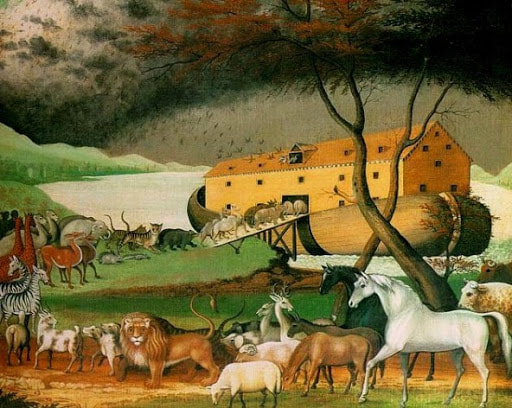Is that so?
And does it really matter?
In a nutshell: No, and quite possibly. These are both historical accounts—real history. And yes indeed, our take on these accounts could have implications for where we each will spend eternity.
So let’s take a closer look. (For a deep dive, you’ll need to do some research. Here’s a good place to start.)
What does the Bible say?
First of all, how does the Bible itself treat these accounts?
Fact is, both are verified multiple times throughout both Old and New Testaments. For instance, check out Jesus’ confirmation of the historicity of Jonah in Matthew 12, and of Noah in Luke 17.
Yes, many of us have been taught since childhood that Noah and Jonah were just stories designed to teach us--well, something or other. But were our teachers eye-witnesses to these events? Were they more reliable truth-tellers than the Bible’s writers? Than Jesus?
Second, to quote virtually every unbeliever since Pontius Pilate, what is truth?
I know the accounts of Noah and Jonah sound like science fiction to skeptics. But are they? Or are they simply demonstrations of the supernatural power of the God who created the universe and everything in it?
Does “goo to the zoo to you” make more sense?
Are supernatural explanations more fantastic than the “goo to the zoo to you” stories we’ve been spoon-fed since childhood?
Think about it: We’ve been taught ad nauseam that evolution is fact. But dig into the subject even superficially, and we find that the evidence does not support this theory, that it instead points straight to the supernatural.
As a starting point, think back to what we've been told about the origins of this universe, when “nothing that was something” allegedly exploded into “everything.” Where did all that “nothing that was something” come from? What caused it to explode? Where did the space it occupied come from? And how about time--where'd that come from?
There is in fact no evidence that would support, via natural mechanisms, the sudden appearance of space, matter, energy and time. There are not even any credible theories being bandied about. Instead, evolutionists pull the “ignore the man behind the curtain” bait-and-switch to turn our attention to fossils (which in truth prove precisely nothing, but that's another subject entirely).
Are Noah and Jonah really so outlandish?
Now let’s apply our critical thinking skills to these supposedly fictitious Old Testament “stories.”
Take the Genesis account of Noah and the global flood, for instance: What is so fantastic about that? We see the geological evidence of it everywhere. Look at aerial photos of the Grand Canyon, and consider what makes more sense – that the “mighty” Colorado River carved the whole thing out, or an enormous flood? (Note that the world’s real-life Chicken Littles are warning us of global catastrophe due to gas-ridden cows and plastic straws, and heads of state worldwide somehow find that perfectly reasonable. But not the Genesis flood.)
Or leap over to the book of Jonah. Is it really impossible for a man to be swallowed by a great fish and survive for three days? Certainly not when the Creator of the universe is in charge; Jesus Himself said, “With God, all things are possible” (Matthew 19:26).
To be sure, there are stories out there of modern-day Jonahs being swallowed by whales. I don’t know that any have been confirmed, however. Most likely, Jonah’s experience was a one-time supernatural event. Do one-time events need subsequent repetition to be proven true? If so, then hmmmm, how come all those evolutionary scientists are still trusting in the Big Bang theory?
What's the problem?
The trouble is that skeptics insist on trying to assign natural causes to supernatural events. That’s simply not necessary when the miraculous is not only possible, but in evidence everywhere we look.
For proof, check out your children and grandchildren. How did those eyes evolve, one step at a time? How did their circulatory systems come to be, bit by bit? How about their immune systems? Their ears? GI systems? Brains?
Darwin himself said, "If it could be demonstrated that any complex organ existed, which could not possibly have been formed by numerous, successive, slight modifications, my theory would absolutely break down.”
Poof!
To learn more about this singularly critical subject, pick up a copy of microbiologist Michael Behe’s book Darwin’s Black Box. It’s enough to bring any honest investigator back to Square One in considering the nature of our very existence.
What difference does it make?
To cut to the chase: Do we need to believe in the historicity of Noah and Jonah in order to get to heaven?
I guess I wouldn’t go that far. But we do need to trust in the Jesus who has revealed Himself in scripture. I’m glad I’m not the judge of how broadly one needs to apply that trust in order to become a heaven-bound child of God; I suppose that there are genuine Christians reading this right now who have embraced evolutionary theory and consider both Noah and Jonah fictional characters.
But do you suppose God might expect us to examine these issues, if we have the time and resources, before dismissing parts of His word as mere fiction? Perhaps to weigh the evidence? I suspect He might.
Here’s the rub: Once we start blowing off anything in the Bible as merely a “story,” we may start feeling free to dismiss anything that doesn’t fit our personal ideas of what’s right, or what makes sense. To cut to the chase once more, we may start feeling free to dismiss Jesus’ claim to be “the way, the truth and the life,” to ignore His assurance that “no man comes to the Father except through Me” (John 14).
This is what that great scientist and theologian Oprah Winfrey did when she declared, "There couldn’t possibly be just one way [to God].” Sadly, unless she repents and trusts in Christ before she draws her last breath, she may be in for a rude awakening when she stands before Him in judgment.
Ah, what do you know?
For three long decades, I was the ultimate atheist. Then my heart was shattered, causing me to set out on an in-depth intellectual journey that lasted well over a year.
My questions: Is there a God? If so, which one? And can I possibly find this theoretical heaven apart from the Christianity that had been trying so diligently to ruin my good times?
I detailed this journey in my memoir Heaven Without Her. If you’re interested, you can probably find a used copy for just pennies online. Suffice to say, the scientific, historical and prophetic evidence I encountered proved to my complete satisfaction that the Bible was supernaturally inspired and is inerrant from first word to last.
Which means I can trust everything it says—including what it says about eternal joy.
If you have doubts, I urge you to investigate it for yourself. Now, before it’s too late.



 RSS Feed
RSS Feed